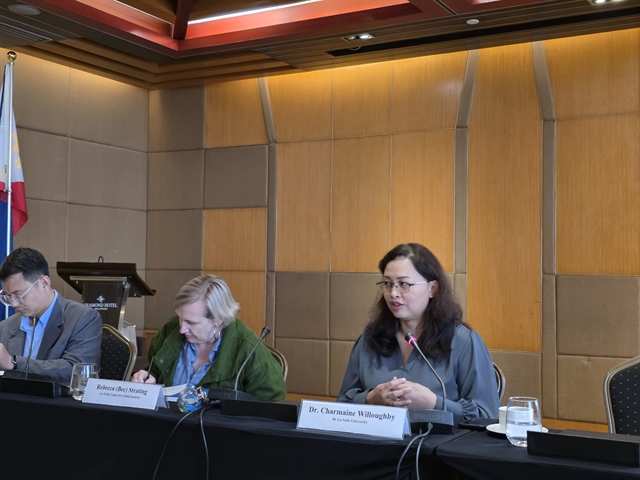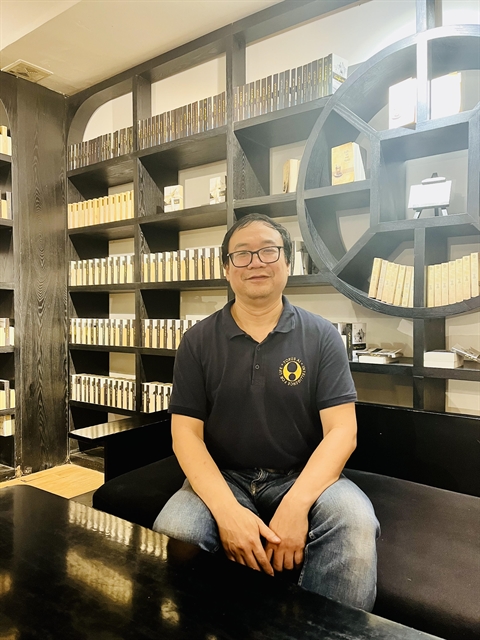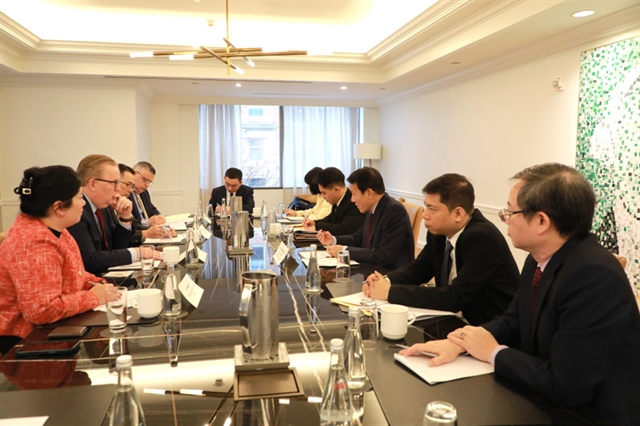 Opinion
Opinion

Professor Nguyễn Tiến Dũng, 53, won a gold medal at the International Mathematical Olympiad (IMO) in 1985 at the age of 15. Professor Dũng now works at Toulouse University and runs Torus AI, his own artificial intelligence (AI) company. He speaks to Việt Nam News reporter Nguyễn Hằng about the potential to develop the AI sector in Việt Nam.
 |
| Professor Nguyễn Tiến Dũng. — VNS Photo Nguyễn Hằng |
Professor Nguyễn Tiến Dũng*, 53, won a gold medal at the International Mathematical Olympiad (IMO) in 1985 at the age of 15. Professor Dũng now works at Toulouse University and runs Torus AI, his own artificial intelligence (AI) company.
He speaks to Việt Nam News reporter Nguyễn Hằng about the potential to develop the AI sector in Việt Nam.
In the race to develop AI, the industry is predicted to generate more than US$15 trillion, equivalent to more than 10 per cent of world economic output annually since 2030. How do you assess the opportunities and challenges to develop the AI sector for a developing country like Việt Nam?
There are many opportunities for Việt Nam to invest in and develop the AI sector. We can see a lot of opportunities in education, health, cyber security and governance. Human resources are the most important factor in AI investment and development, and Vietnamese people are very smart. The Vietnamese people’s intellectual potential is no less than other countries. The biggest strength of Việt Nam today is having a team of young AI researchers who are well-trained abroad. Việt Nam also ranks second in Southeast Asia in the number of AI patents.
Looking at the reports of some international organisations, we see that China is expected to have the opportunity to benefit the most from AI development, up to 26 per cent, followed by the United States at 14 per cent, and Việt Nam at about 5 per cent. But if we look at it optimistically, we can make efforts so that it does not stop at 5 per cent but can go up to 15 per cent or higher.
The challenge that Việt Nam has to face when developing the AI sector is that the data and computing infrastructure is still in its infancy. Although there is a lot of data, it is scattered, and the data is mainly in its raw form, unprocessed and unstandardised.
Besides, there are dozens of risks in investing and developing AI. Then it is recommended that we recognise what we are lacking and find ways to fill in the lack to avoid risks. In addition, it should gather a network of people to work together on AI to fill in for what we lack. The wider the network we set up, the better chance we have to develop the AI sector. Individuals and organisations also need dynamism to face challenges and look for investment opportunities.
Could you give some recommendations to Việt Nam in developing and applying AI?
Việt Nam is advised to invest heavily in the AI ecosystem, including computer hardware and software, cloud computing, data, machine learning algorithms, AI applications, user markets, and regulatory systems, to benefit greatly from the AI sector.
Every field is necessary, and it has many opportunities to develop AI, but each individual and organisation should choose the fields in which they have advantages, few barriers, and easily create surplus value; at the same time, they have to overcome their weaknesses through learning, co-operation, and importing technology.
Besides, grasping modern AI tools and applications and learning to use them will help increase labour productivity. It is highly recommended.
For example, there are a lot of applications based on an AI platform for natural language processing like ChatGPT (ChatGPT is a natural language processing tool driven by AI technology that allows you to have human-like conversations and much more with the chatbot) to solve different jobs from translation to prescription drugs, programming or art creation.
Some people worry that AI is a threat to jobs. What do you think about it?
The trend that AI can do many things humans are doing is inevitable. Like in the old days, machines also replaced humans during the history of development. Ploughs work more efficiently than humans do.
So, AI is the same. It is a tool to free people from hard work. Then people can focus on doing things that bring higher value, such as creating. If we view it from a positive perspective, we will see that this is a good opportunity for the world and Việt Nam in particular.
Some people worry that AI will make them lose their jobs, but the reality is that if they lose a job, they can do another job. So that is not a concern. For example, if a company cuts 8,000 employees and uses AI to replace them, other start-ups always grow and create jobs for those 8,000 employees. There are always new jobs and new opportunities for everyone. So, do not worry!
AI will not be able to replace humans completely. If AI imitates humans, we continue to create, change and innovate. But this also requires each person to equip a solid knowledge base and not hesitate to change. — VNS
*Nguyễn Tiến Dũng won a gold medal at the International Mathematical Olympiad (IMO) at the age of 15 when he was a high-school student at the University of Science's High School. In 1986, after winning the gold medal, he went to the Soviet Union to study at the Faculty of Mathematics - Mechanical, Lomonosov Moscow State University. In 1994, at 24, he successfully defended his doctoral thesis in mathematics at the University of Strasbourg. In 2007, France’s National Commission for Higher Education on Universities awarded him the title of first-class professor at 37. In 2015, the commission awarded him the title of special professor. Leaving Việt Nam for more than 30 years, he still has many activities towards Việt Nam. He and his friends created "Sputnik Bookcase" to bring the best pedagogical and educational books to students in Việt Nam in 2015. He also makes references or directly guides Vietnamese PhD students in France.
VN - AI hub in ASEAN by 2030
HÀ NỘI — The Vietnamese Government issued on January 2021 a national strategy on the research, development and application of artificial intelligence (AI) by 2030 to gradually turn Việt Nam into an innovation and AI hub in ASEAN and the world.
The strategy aims for Việt Nam to be among four leading countries in ASEAN and 50 nations globally in terms of AI research, development and application by 2030; build 10 prestigious AI trademarks in the region; and develop three big national data and high-performance computing centres.
By 2030, Việt Nam is scheduled to set up 50 interconnected open databases in economic sectors in service of the effort.— VNS




